PEP六年级上册英语第5单元知识点
六年级上册英语第5单atalk

英语六年级上册第5单元atalk知识点归纳总结一、核心词汇本单元的核心词汇通常围绕着一个中心主题,如学校生活、日常活动、健康习惯等。
学生需要掌握这些词汇的拼写、发音和意思。
例如:school 学校classroom 教室library 图书馆playground 操场office 办公室teacher 老师student 学生book 书pencil 铅笔eraser 橡皮bag 书包computer 电脑lesson 课程activity 活动homework 家庭作业breakfast 早餐lunch 午餐dinner 晚餐healthy 健康的unhealthy 不健康的二、重点句型重点句型通常包括描述日常活动、表达喜好、询问信息等基本交际功能。
例如:What time do you get up? 你几点起床?I usually get up at 7 o'clock. 我通常七点起床。
What do you have for breakfast? 你早餐吃什么?I have milk and eggs for breakfast. 我早餐喝牛奶吃鸡蛋。
Does your school have a library? 你们的学校有图书馆吗?Yes, it does. / No, it doesn't. 是的,有。
/ 不,没有。
How often do you do sports? 你多久做一次运动?I do sports three times a week. 我一周做三次运动。
We should eat healthy food. 我们应该吃健康的食物。
I agree. Healthy eating habits are important. 我同意。
健康的饮食习惯很重要。
三、语法知识点本单元的语法知识点可能包括一般现在时、频率副词、介词的使用等。
例如:一般现在时:表示经常性的动作或存在的状态,常与always, often, usually等频率副词连用。
新人教版(PEP)小学英语六年级上册各单元知
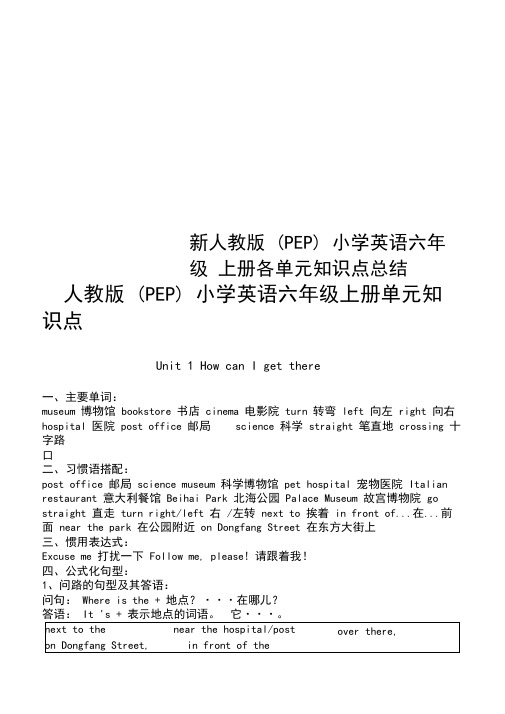
新人教版 (PEP) 小学英语六年级上册各单元知识点总结人教版(PEP) 小学英语六年级上册单元知识点Unit 1 How can I get there一、主要单词:museum 博物馆bookstore 书店cinema 电影院turn 转弯left 向左right 向右hospital 医院post office 邮局science 科学straight 笔直地crossing 十字路口二、习惯语搭配:post office 邮局science museum 科学博物馆pet hospital 宠物医院Italian restaurant 意大利餐馆Beihai Park 北海公园Palace Museum 故宫博物院go straight 直走turn right/left 右/左转next to 挨着in front of...在...前面near the park 在公园附近on Dongfang Street 在东方大街上三、惯用表达式:Excuse me 打扰一下Follow me, please! 请跟着我!四、公式化句型:1、问路的句型及其答语:问句:Where is the + 地点?···在哪儿?答语:It 's + 表示地点的词语。
它···。
2、询问怎么到某地的句型及其答语:问句:How can +主语+ get (to)+地点?···怎么到···?同义句型:Can you tell me the way to + 地点?Where is + 地点?Which is the way to + 地点?答语:Turn +方向+表示地点的介词短语。
···转。
at the cinema at the corner near the post office...五、例句:Where is the cinema, please? 请问电影院在哪里?It ' s next to the hospital. 它与医院相邻。
Pep 人教版六年级英语上册第五单元Unit 5 What does he do 知识总结
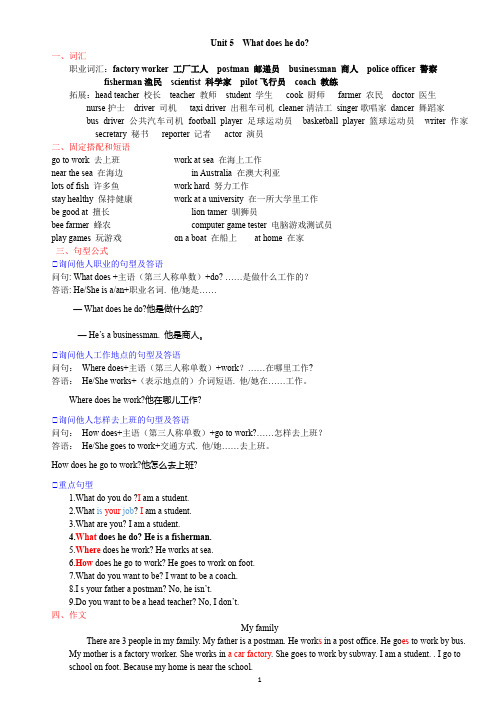
Unit 5 What does he do?一、词汇职业词汇:factory worker 工厂工人postman 邮递员businessman 商人police officer 警察fisherman渔民scientist 科学家pilot飞行员coach 教练拓展:head teacher 校长teacher 教师student 学生cook 厨师farmer 农民doctor 医生nurse护士driver 司机taxi driver 出租车司机cleaner清洁工singer歌唱家dancer 舞蹈家bus driver公共汽车司机football player足球运动员basketball player篮球运动员writer 作家secretary 秘书reporter 记者actor 演员二、固定搭配和短语go to work 去上班work at sea 在海上工作near the sea 在海边in Australia 在澳大利亚lots of fish 许多鱼work hard 努力工作stay healthy 保持健康work at a university 在一所大学里工作be good at 擅长lion tamer 驯狮员bee farmer 蜂农computer game tester 电脑游戏测试员play games 玩游戏on a boat 在船上at home 在家三、句型公式☆询问他人职业的句型及答语问句: What does +主语(第三人称单数)+do? ……是做什么工作的?答语: He/She is a/an+职业名词. 他/她是……— What does he do?他是做什么的?— He’s a businessman. 他是商人。
☆询问他人工作地点的句型及答语问句:Where does+主语(第三人称单数)+work?……在哪里工作?答语:He/She works+(表示地点的)介词短语. 他/她在……工作。
六年级英语pep上册第五单元重点句形
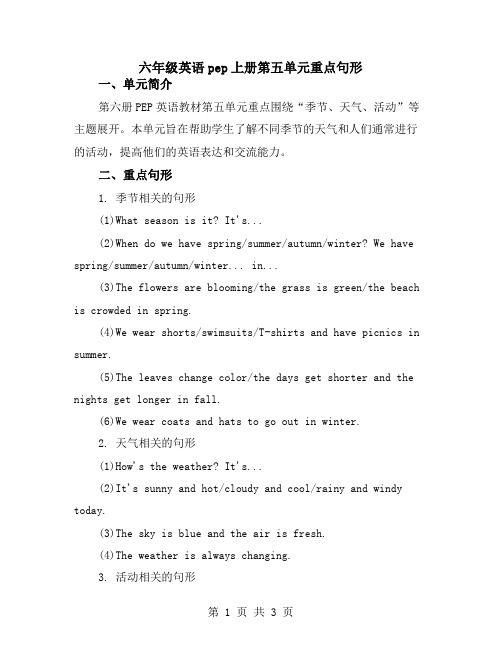
六年级英语pep上册第五单元重点句形一、单元简介第六册PEP英语教材第五单元重点围绕“季节、天气、活动”等主题展开。
本单元旨在帮助学生了解不同季节的天气和人们通常进行的活动,提高他们的英语表达和交流能力。
二、重点句形1. 季节相关的句形(1)What season is it? It's...(2)When do we have spring/summer/autumn/winter? We have spring/summer/autumn/winter... in...(3)The flowers are blooming/the grass is green/the beach is crowded in spring.(4)We wear shorts/swimsuits/T-shirts and have picnics in summer.(5)The leaves change color/the days get shorter and the nights get longer in fall.(6)We wear coats and hats to go out in winter.2. 天气相关的句形(1)How's the weather? It's...(2)It's sunny and hot/cloudy and cool/rainy and windy today.(3)The sky is blue and the air is fresh.(4)The weather is always changing.3. 活动相关的句形(1)What do you do in spring? We plant trees and flowers.(2)We usually go hiking in summer.(3)We watch movies and play games in fall.(4)We eat hot pot and watch snow in winter.(5)I like playing in the rain because it's fun to splash in puddles.(6)I usually watch TV and read books on rainy days.三、用法和注意事项以上重点句形在英语学习中具有重要应用价值。
六年级英语上册 Unit 5 What does he do单元整体分析 人教PEP

Unit Five What does he do?单元整体分析本单元是人教版英语六年级上册的第五单元,单元的话题是“What does he do”本单元通过不同的场景,提供了表达比较人物的职业和生活情况的句型。
共三个版块:A 部分,B部分和C 部分。
A部分包括重点词汇和情景对话,共两个课时。
第一课时通过呈现张鹏和Oliver在职业体验日谈论自己父母工作的场景,引出四会单词和词组factory worker, postman, businessman, police officer及询问职业的句型What does ... do? He/She’s...第二课时通过Sarah和Oliver在家长日谈论自己父母的情景,巩固和运用第三人称单数的特殊疑问句。
A部分重点掌握词汇和询问职业的句型。
B部分包括重点词汇、情景对话和读和写,共三个课时。
第一课时通过Oliver和吴一凡谈论自己家人工作情况,引出四会单词fisherman, scientist, pilot, coach和询问工作地点的句型Where does/he she work? He/She works...第二课时依旧通过Mike和小雨在回家路上聊自己家人工作和生活的场景,进一步掌握询问他人工作地点和交通工具的句型。
第三课时通过阅读文段和语音知识,拓展本单元所学句型及了解逗号的作用。
B部分重点掌握四会单词和核心句型Where does/he she work? He/She works...How does...go to work? He/She goes to work..最后把B部分的听力测试、本单元句型归纳和C部分的故事,整理成一课时,重点是复习和巩固本单元所学重点词汇和句型。
在课堂教学中,首先要整体把握本单元教学内容,教学重点和教学难点,了解学生学情。
然后围绕本单元主题展开教学设计。
借助自制PPT课件、网络资源、词卡、图片等多种方式呈现,引导学生运用游戏、创编对话等方法在合作学习中和任务型学习中表达所学语言。
新版pep六年级上册英语-各单元知识点总结

Unit 1 How can I get there?一:重点单词和短语Science科学 , museum博物馆 , post office, bookstore, cinema, hospitalLondon Eye 伦敦眼 , stomach胃,crossing 十字路口 , turn left, turn right,go straight=walk straight 直走 .next to 紧挨着 /与...相邻 far from( 离...远),near 在...附近 behind(在 ...后面) in front of (在 ...前面)between ⋯ and⋯(在 ...和 ...之间)二:按要求写单词:hot(反义词 )cold , cool(反义词 )warm,too(同音词) to/two can not(缩写 )can ’tright(反义词 )left/wrong buy(同音词 )by/bye sea(同音词 )see first(基数词) onefour(序数词 )fourth did (原形 )do /does three(序数词 )third give(过去式 )gave三:重点句型分析1. Where is the museum shop?此问句是由特殊疑问词 where 引导的一个特殊疑问句, where 意为“在哪里,到哪里”,用来询问地点,放在句子的开头。
询问“某人或某物在哪里”的基本句型是:“ Where +is/are+主语?”, where is 后接名词或代词的单数形式, where are 后接名词或代词的复数形式。
表示地点的词: museum 博物馆 , post office 邮局 , bookstore书店 , cinema电影院 , hospital医院 restaurant餐馆 bank 银行 bus stop公交车站 lake 湖 library 图书馆 zoo 动物园 school 学校 park 公园 garden花园 hotel 旅馆2. It ’ s near the door.此句中 near 是表示位置的介词,意为“旁边,附近”,其同义句是:It’s next to the door它在.门的旁边。
人教版PEP 英语六年级上册 全册各单元知识点总结
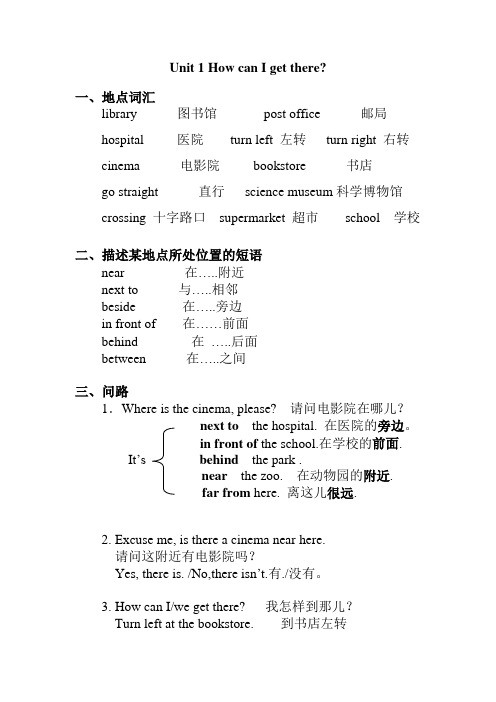
Unit 1 How can I get there?一、地点词汇library 图书馆post office 邮局hospital 医院turn left 左转turn right 右转cinema 电影院bookstore 书店go straight 直行science museum科学博物馆crossing 十字路口supermarket 超市school 学校二、描述某地点所处位置的短语near 在…..附近next to 与…..相邻beside 在…..旁边in front of 在……前面behind 在…..后面between 在…..之间三、问路1.Where is the cinema, please? 请问电影院在哪儿?next to the hospital. 在医院的旁边。
in front of the school.在学校的前面.It’s behind the park .near the zoo. 在动物园的附近.far from here. 离这儿很远.2. Excuse me, is there a cinema near here.请问这附近有电影院吗?Yes, there is. /No,there isn’t.有./没有。
3. How can I/we get there? 我怎样到那儿?Turn left at the bookstore. 到书店左转4. How can I get to the hospital? 我该怎样到达医院呢?Take the No.57 bus. 乘坐第57路公汽。
By the No. 57 bus.注意:到那儿get there到某地get to Canada/Australia/Beijing/ Shanghai/Wuhanget to the hospital/zoo/bookstore四、指引路1.You can take the No.32 bus.你可乘坐312路公交车去那儿.注意:You can go by the No.32 bus.与上句意思一样,只是说法不同。
六年级上册英语知识梳理第五单元
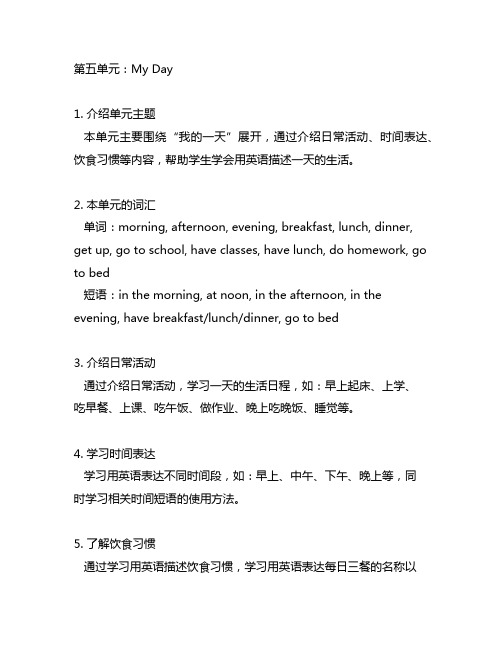
第五单元:My Day1. 介绍单元主题本单元主要围绕“我的一天”展开,通过介绍日常活动、时间表达、饮食习惯等内容,帮助学生学会用英语描述一天的生活。
2. 本单元的词汇单词:morning, afternoon, evening, breakfast, lunch, dinner, get up, go to school, have classes, have lunch, do homework, go to bed短语:in the morning, at noon, in the afternoon, in the evening, have breakfast/lunch/dinner, go to bed3. 介绍日常活动通过介绍日常活动,学习一天的生活日程,如:早上起床、上学、吃早餐、上课、吃午饭、做作业、晚上吃晚饭、睡觉等。
4. 学习时间表达学习用英语表达不同时间段,如:早上、中午、下午、晚上等,同时学习相关时间短语的使用方法。
5. 了解饮食习惯通过学习用英语描述饮食习惯,学习用英语表达每日三餐的名称以及相关用餐动作。
6. 总结通过本单元的学习,学生能够掌握日常活动的英语表达、时间表达以及饮食习惯的英语表达,为日常生活中的英语交流打下坚实基础。
通过本文章的介绍,学生能够了解到本单元的主要内容和重点,以便更好地进行学习和复习,同时也能帮助老师和家长更好地指导和辅导学生的学习。
7. 吸收生活常识在学习“我的一天”的过程中,学生不仅能够学会用英语描述日常活动,还能够借此了解更多关于日常生活的常识。
他们可以了解到不同国家和地区的人们在早餐、午餐和晚餐中喜欢吃些什么样的食物,从而拓宽他们的视野,增加他们对不同文化的认识。
在学习中,老师可以通过图片、视瓶或真实情境的模拟等方式,让学生更直观地了解不同文化下的生活方式,从而培养他们的跨文化意识和包容心。
8. 提高日常生活的英语交流能力通过学习这些关于日常生活的词汇和短语,学生可以在语言环境中更流利地描述自己的一天。
- 1、下载文档前请自行甄别文档内容的完整性,平台不提供额外的编辑、内容补充、找答案等附加服务。
- 2、"仅部分预览"的文档,不可在线预览部分如存在完整性等问题,可反馈申请退款(可完整预览的文档不适用该条件!)。
- 3、如文档侵犯您的权益,请联系客服反馈,我们会尽快为您处理(人工客服工作时间:9:00-18:30)。
Unit 5 What does he do?一、主要单词:factory 工厂worker工人postman邮递员businessman商人police officer警察fisherman渔民scientist科学家pilot飞行员coach教练singer歌手dancer舞蹈家writer作家head teacher 校长secretary 秘书reporter记者country 国家sea 大海stay保持university 大学if 如果use使用type打字quickly迅速地gym体育馆or 或者title名称,标题other其他的二、习惯搭配:by car/bus/bike/plane/boat 乘小汽车/公共汽车/自行车/飞机/船go to work去上班study hard 努力学习work hard努力工作hard-working 工作努力的; 辛勤的; stay healthy保持健康go home 回家lots of 许多a lot of 许多go to the camp去度假营be good at...擅长···三、重点句型:1、询问他人的职业的句型及其答语;问句:What does+主语(第三人称单数)+do? ···是做什么的?答语:He/She is a /an+职业名称. 他/她是一位···。
Eg. --What does he do ?=What is he ?他是做什么的?. --He is a doctor.他是一个医生。
①、_________________________你的叔叔做什么的?_________________________他是一名警察。
②、_________________________你是做什么的?_________________________我是一名运动员。
【拓展】询问职业还可以用句型“What+be动词+主语?”或“What+be动词+sb’s job?”What is your father?你爸爸做什么工作?(你爸爸是什么?)What is your mother’s job? 你妈妈做什么工作?(你妈妈的工作是什么?)--What do you do ?=What are you ?=What’s your job?你是做什么的?--I ’m a student .我是一个学生。
练习:你爸爸做什么工作?________________________________________________________________________2、询问他人的工作地点的句型及其答语:问句:Where does+主语(第三人称单数)+work?···在哪儿工作?答语:He/She works+(表示地点的)介词短语. 他/她···工作。
Eg. --Where do you work ? 你在哪儿工作?--I work in a school . 我在一个学校工作。
----Where does she / your mother work ?她/你妈妈在哪儿工作?----She works in a hospital .她在一个医院工作。
一般疑问句:----Does he work in a factory ?他在工厂工作吗3、询问他人的上班方式的问句及其答语:问句:How does +主语(第三人称单数)+go to work? ···怎么去上班?答语:He/She goes to work+交通方式. 他/她···去上班。
表交通方式——by bike/bus/subway/plane/train/ship/ferry/...on footEg. --- How does your father go to work ?你父亲怎么去上班?-- He goes to work by car . 他开车去上班。
4、I’m going to be a head teacher one day.5、she’ll be = she will be, will 是“将会,将要”的意思,will+动词原形→will do sth,“将会做某事”Eg. She’ll be here today!6、“want to do sth”--------“be going to do sth”Eg. Do you want to be a head teacher ,too?我想吃汉堡包→ I want to eat hamburger.我打算去吃汉堡包→ I am going to eat hamburger.她想成为一名舞蹈员→ She wants to be a dancer.她打算成为一名舞蹈员→ She is going to be a dancer.7、He works very hard and stays healthy.8、be good at+ sth, 擅长某事be good at doing sth.擅长做某事Eg . Hu Bin likes sports.He is good at football,ping-pong and basketball.He is good at football = He is good at football.She is good at piano =9、What a great job!由What引导的感叹句——其结构为:What+a(an)+形容词+名词+(主语+谓语)可省略,Eg:What an interesting story it is !多有趣的故事啊!What a lovely day it is!多好的天气啊!What interesting books they are!多有趣的书啊!What bad weather it is!多坏的天气啊!在口语中,这类感叹句有时常省略主语和谓语,如:What a big fish!多大的一条语啊What a pretty girl!多秀丽的女孩啊!What a beautiful bird!多么漂亮的一只鸟啊!。
【拓展】由how引导的感叹句——其结构为:How+形容词(副词)+主语+谓语!Eg.:How big the dining room is!餐厅真大啊!How lovely the girls are!这些女孩真可爱!How beautiful those flowers are!这些花真美啊!How hard he studies!他学习多么努力啊!How carefully Li Yan listens!李艳听得多么认真啊!在口语中,这类感叹句有时常省略主语和谓语,只保留感叹部分。
Eg.: How clean! 真干净!How fast!多么快啊!10、She can type very quickly她可以打字很快。
【拓展】大多数副词都是以“ly”结尾的carefully小心地 happily快乐地 loudly大声地也有例外:well 好地, do well 做得好!do well in (在......方面做得好) = be good at... (在......方面是很擅长的)11、lots of = a lot of,意为“许多”,其后可接可数名词以及不可数名词!many+可数名词复数much+不可数名词I have lots of friends = __________________________I have a lot of money = __________________________四、一些由动词变化而来的职业名词:teach—teacher clean—cleaner sing—singer dance—dancer drive—driver write—writer TV report—TV reporter act—actoract—actress art—artist engine—engineer五、主题写作:家人的职业及出行方式模板:1、描述家人的职业My +称谓+is a/an+职业名词.2、描述家人的工作地点He/She works in /on/ at +地点.3、描述家人去上班的交通方式He/She goes to work on foot /by +交通工具.范文I Love My FamilyHere is a photo of my family.There are four people in my family.They are my father,my mother, my brother and me.My father is a doctor.He works in a hospital.He goes to work by subway.My mother is a teacher.She works in a school near my home.She goes to work by bike.Look, the tall boy is my brother.He is older than me.He is a pilot.He’s in Beijing now.He goes there by plane.I am a student now.I love my family.练习题一、写出下列单词。
邮递员商人警察工人飞行员教练科学家渔民教师歌手作家舞蹈家清洁工记者二、按要求写单词study(单三) go(单三) do(单三) work(单三)stay(单三)write(名词)farm(名词)country(复数)have(单三)sing(名词)三、翻译1、你的爸爸是做什么的?2、你的妈妈在哪里工作?3、你姐姐怎么去上班。
4、He works tat sea.5、I am going to be a pilot.四、按要求写句子1.He is a worker.(对划线部分提问)2.She works in an office. (对划线部分提问)3. My mother goes to work by car. (对划线部分提问)4.Sarah likes using computer. (疑问句)五、单选题( )1.-- What ____your father ______ ? --He is a teacher.A.does; doesB.do; doC.does; doD.do;does ( )2.--_________ does she go ? --She goes to the bank .A.WhereB.HowC.WhatD.Who ( )3.--_____ does she go to work ? --She goes to work by subway.A.WhereB.HowC.WhatD.Who ( )4.Do you like ______?A. swimB. swimmingC. swimingD. swim, too ( )5. Alice ______ to school by bus every day.A. is going toB. goC. goesD. to go。
